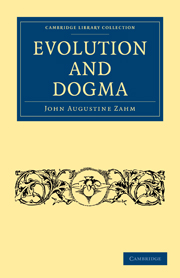Book contents
- Frontmatter
- PREFATORY NOTE
- Contents
- INTRODUCTION
- PART I EVOLUTION, PAST AND PRESENT
- CHAPTER I NATURE AND SCOPE OF EVOLUTION
- CHAPTER II EARLY EVOLUTIONARY VIEWS
- CHAPTER III FOSSILS AND GIANTS
- CHAPTER IV SPONTANEOUS GENERATION AND SCIENTIFIC DISCOVERY
- CHAPTER V FROM LORD BACON TO CHARLES DARWIN
- CHAPTER VI CONTROVERSY AND PROGRESS
- CHAPTER VII EVIDENCES OF EVOLUTION
- CHAPTER VIII OBJECTIONS AGAINST EVOLUTION
- PART II EVOLUTION AND DOGMA
- AUTHORS AND WORKS CITED IN “EVOLUTION AND DOGMA.”
- GENERAL INDEX
CHAPTER V - FROM LORD BACON TO CHARLES DARWIN
Published online by Cambridge University Press: 29 August 2010
- Frontmatter
- PREFATORY NOTE
- Contents
- INTRODUCTION
- PART I EVOLUTION, PAST AND PRESENT
- CHAPTER I NATURE AND SCOPE OF EVOLUTION
- CHAPTER II EARLY EVOLUTIONARY VIEWS
- CHAPTER III FOSSILS AND GIANTS
- CHAPTER IV SPONTANEOUS GENERATION AND SCIENTIFIC DISCOVERY
- CHAPTER V FROM LORD BACON TO CHARLES DARWIN
- CHAPTER VI CONTROVERSY AND PROGRESS
- CHAPTER VII EVIDENCES OF EVOLUTION
- CHAPTER VIII OBJECTIONS AGAINST EVOLUTION
- PART II EVOLUTION AND DOGMA
- AUTHORS AND WORKS CITED IN “EVOLUTION AND DOGMA.”
- GENERAL INDEX
Summary
First Materials for the Controversy
I HAVE spoken of the celebrated dispute between Cuvier and Geoffroy Saint-Hilaire, in which Goethe was so much interested. Materials for this controversy had been rapidly accumulating during the half century preceding the date when it finally broke out in the French Academy. Indeed, it would be truer to say that materials had been accumulating during two centuries prior to the historic debate between Cuvier and Geoffroy Saint-Hilaire. From the time of Bacon, Descartes and Leibnitz, more, far more, had been done towards the development of the Evolution idea than had been effected during all the centuries which had elapsed between the earliest speculations of the Ionian school and the publication of the “Novum Organum.”
We have already learned what geology and paleontology contributed towards the establishment of the theory of Evolution. We have seen how the study of fossils and the careful and long-continued examination of the much-vexed question of spontaneous generation shed a flood of light on numerous problems which were before obscure and mysterious in the extreme. But while Da Vinci, Fracostoro, Palissy, Steno, Generelli, Redi, Malpighi, Leeuwenhoek, Schwammerdam and their compeers, were carrying on their investigations regarding fossils and infusoria, students in other departments of science were not idle. Gesner, Vesalius, Fallopius, Fabricius and Harvey were then conducting their famous researches in zoölogy, anatomy, and embryology, while Cesalpinus, Ray, Tournefort and Linnæus were laying the secure foundations of systematic botany and vegetable anatomy.
- Type
- Chapter
- Information
- Evolution and Dogma , pp. 55 - 64Publisher: Cambridge University PressPrint publication year: 2009First published in: 1896



